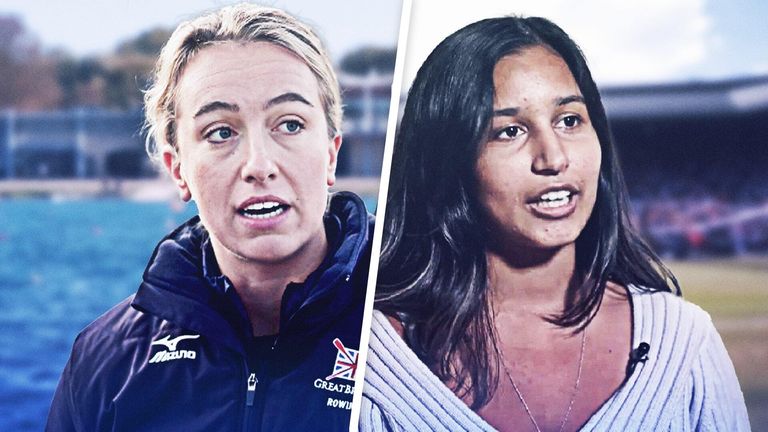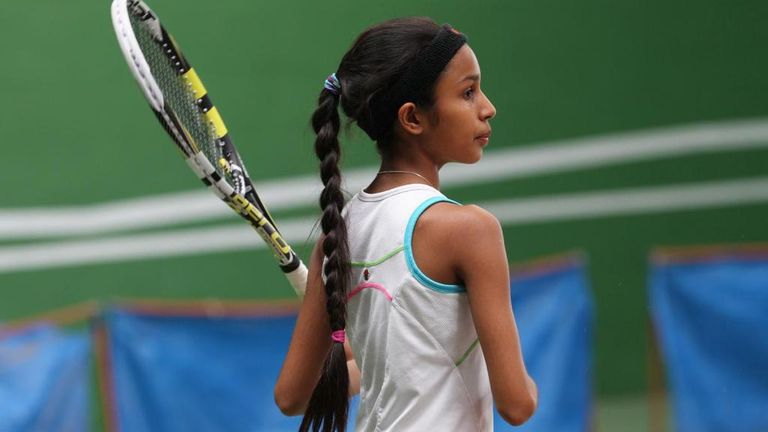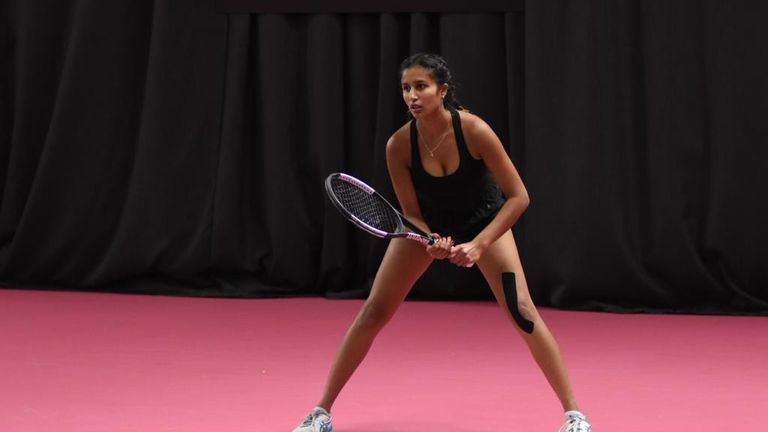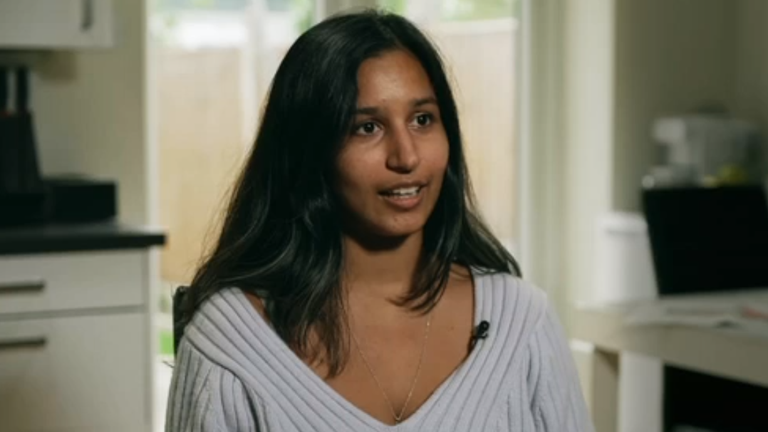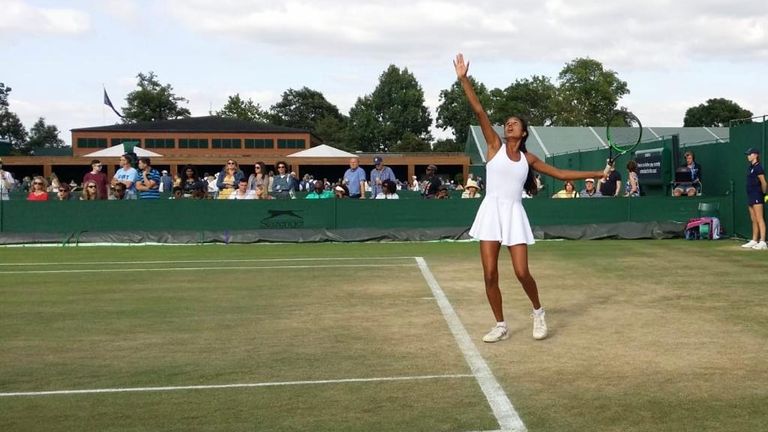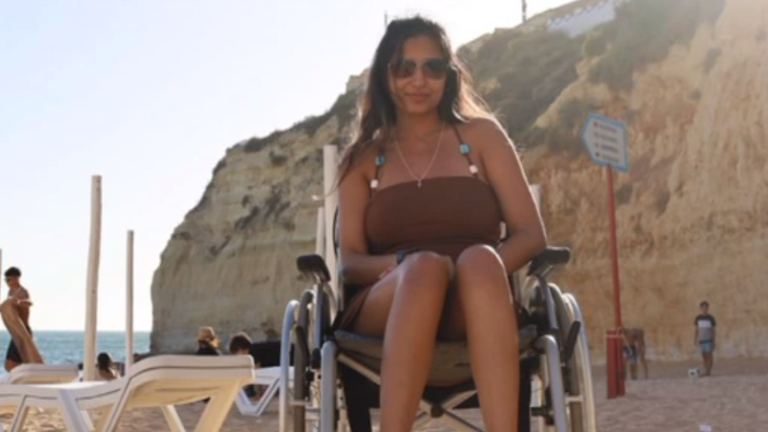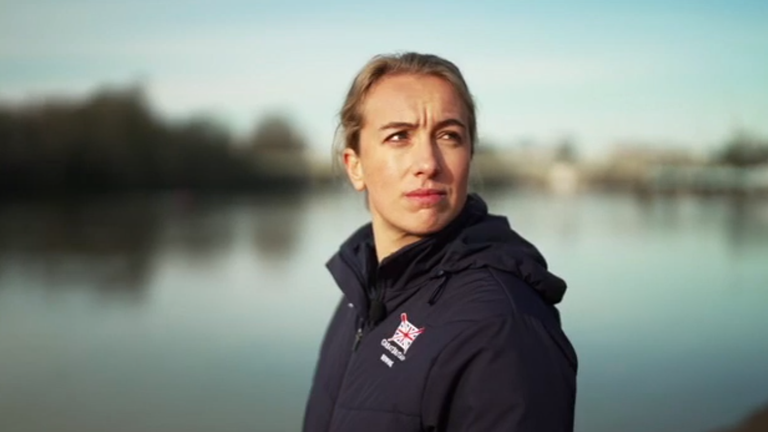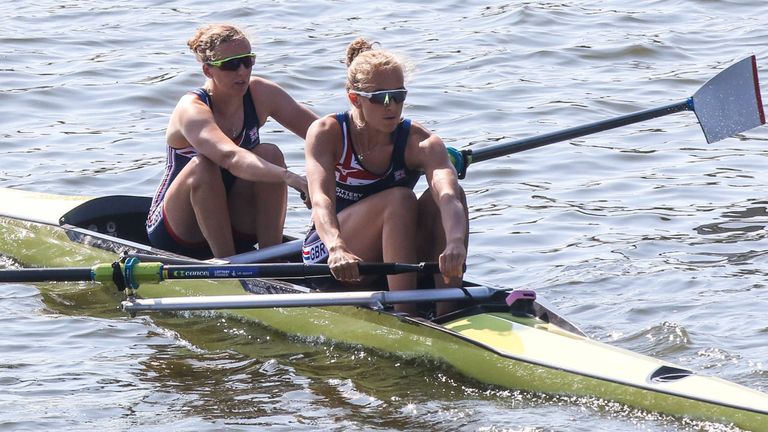How long Covid ruined a tennis prodigy's dream and a rower's Olympics | 'I leave the house every two weeks'
Tanysha Dissanayake and Oonagh Cousins discuss the impact long-Covid has had on their careers; Dissanayake was a promising tennis star, while Cousins was training for the Tokyo Olympics before testing positive for the virus
Tuesday 11 April 2023 16:27, UK
Sky Sports News spoke with Tanysha Dissanayake and Oonagh Cousins, who both had lofty ambitions in tennis and rowing respectively, but those dreams have been shattered by long Covid...
Only a couple of years ago, Tanysha Dissanayake dreamt of travelling the world playing tennis and lifting trophies.
Today her focus and ambition couldn't be more contrasting.
"The day I can leave the house whenever I want and not have to worry about the repercussions of it and the recovery time, that will be the best day ever," said Dissanayake, who is now a former tennis player after Covid took away everything she knew and loved.
"Right now, tennis is not on my mind. I think I have to focus mostly on my recovery and being able to live like a normal 21-year-old again."
She first picked up a racket at the age of four. By eight, she was travelling the world alone - her mum sent her to compete in India to help toughen her up - and by the time she was 12 she was ranked No 1 for her age in the world.
Dissanayake remembers clearly the moment her life changed forever on July 12, 2021.
She was watching a film alongside her friend, a few hours later her friend tested positive for Covid, soon after so did she.
"Initially TheI thought I wasn't really going to be that unwell, and then I was. I still thought I'd recover in less than two weeks, like all of my friends did," she explained.
"After a few days, I started to have breathing difficulties. I didn't go to hospital or anything, but I did struggle to even get in the shower, and at that point I did know that I had it a bit worse.
"I think within 10 days it kind of settled down a little bit, so I thought I was going to be okay."
'I leave the house every two weeks'
She was far from okay. Fast-forward nearly two years and Dissanayake is housebound and if she does go out relies on a wheelchair.
"It's been something I could never have prepared for. I leave the house once every two weeks, only for an hour, and then it takes me five days to recover.
"I can't cook, I can't clean, I can't do anything. I have had to stop my education. I've had to stop playing tennis. I've had to stop everything I've ever known and loved.
"My life is pretty much on hold right now. A few months ago, I could barely even open my eyes to watch Netflix, so it's pretty different to how it used to be."
Sitting down and talking to Dissanayake, I struggle to comprehend how somebody so fit and healthy has had her world blown apart by this virus.
She has been given little choice but to accept her fate, adding: "If I do think about it too much or like when you mention it, then it does definitely hit a nerve because it's what I've spent my whole life working towards.
"Since I was four years old, that has been my whole life. I've sacrificed a lot. My family have sacrificed a lot. It's all I ever wanted. So for that to be taken away just because of the virus, it's something that's not easy. It's not something anyone can ever prepare you for."
'I loved every minute of it but now feel forgotten'
Last October, she announced her retirement from tennis, aged just 21. It's hard for her to not wonder what might have been especially when you look at what her compatriots, the likes of Emma Raducanu, have gone on to achieve.
She recently calculated that she has competed in 21 countries, and as we sit, she points to one of her favourite pictures in the stack of memorabilia in front of us - the one of her Wimbledon debut.
"I'm so grateful for what I did get to do, to achieve and experience. I definitely hoped I'd have a few more years to play the biggest slams in the world to play Wimbledon again, because that experience was something not many people get to do and I loved every minute of it. It's not easy, it's not."
Perhaps the hardest thing for someone that is so driven by process and outcome has been the void of answers - despite numerous scans, blood tests and expert consultations.
Why has this happened, and even more challenging for Dissanayake and almost two million people in the UK who are currently suffering with long Covid is when it might end.
"I think I can speak on behalf of the whole long Covid community when I say that we feel forgotten, we don't feel like anyone's trying to understand the virus and what we're going through.
"We feel like no one's trying to help us. No one is trying to find a cure. I feel like I'm getting left behind in life with all my friends. They're continuing on with their lives.
"They're doing what they love and I'm just kind of here at a standstill, and I just don't think people are taking it seriously enough. I take pretty much every pill under the sun. I try cold water therapy.
"I try yoga. I try meditation. I try everything I can but the only thing that is going to help my body is time. That's so hard to accept because when you don't know how long it's going to take to get better, it becomes really hard to stay positive and optimistic about a recovery."
How Covid ruined Oonagh Cousins' Olympic dream
Rower Oonagh Cousins knows only too well how cruel the symptoms of long Covid can be. Today, she has been forced to announce her retirement from the sport she loved.
She can't remember the exact moment she caught the virus - she felt run down and tired back in February 2020 as she pushed her body during final testing for the Tokyo Olympics.
It wasn't until August that year, an antibody test revealed she had had Covid. Mentally it helped knowing what was causing her fatigue, but Cousins could never have envisaged how her world was about to unfold.
"I was never that sick at the beginning. I just had a cough. I was thinking I just need a couple more weeks to get better, I need a couple more weeks and it went on like that for months just thinking I need a bit more time to rest and I'll get better. We were in lockdown.
"I think if I had to drive to training it would have been quite clear quite quickly how sick I was but you're just sitting at home doing nothing and there's a million reasons to not feel right at that time. The world is chaotic.
"I went backwards and forwards for quite a long time before thinking okay, this is a long-term thing and I'm going to have to adjust my expectations."
The dream of the Tokyo Olympics was over, but things were about to get much worse.
"It's a bit scary looking back how normal you make it, I think it was one of my coping strategies."
Cousins was struggling to function at the most basic level, she had a small window for only a couple of hours a day to live her life and it was taking its toll mentally.
"You're being very careful about not overdoing it. Every half an hour I was thinking how am I doing? Am I doing too much? How is my body feeling? Is it telling me that I'm overdoing it or not? Do I need to go home to rest?
"I find the word fatigue annoying because when you tell people you have fatigue it sounds like you just need a good night's sleep and it's not you're really sick. The way I try to explain it is much closer to a really bad case of flu."
This continued for 18 months. Like Dissanayake there were no answers, no cures - every test was coming back clear, the only answer it seemed was time and rest.
"What is not well understood is how the illness impacts the way your mind works. It really drains the life out of you. It sucks your personality away.
"It stops you feeling joy and happiness towards things that gave you happiness and joy before. Just at the moment when you're going through something really hard, your resilience and your ability to cope is taken away. So it hits you twice over."
'My desire for rowing was not there'
Slowly, very slowly every few weeks Cousins' energy envelope began to slowly increase.
"The main issue every day was just being well. My desire for rowing was not there. I think your body disconnects from your mind. Your frame of reference just changes.
"There's a lot of grief that I then kind of processed after getting better when I finally had the headspace to realise what had happened."
By September 2021 she started to feel like herself again and began to think about rowing. Cousins started training from scratch alongside the team at the English Institute of Sport, and her progress was encouraging.
Research around the virus was beginning to emerge and Cousins looked to be defining the long Covid odds of becoming one of the first athletes to recover and compete at the highest level, perhaps even fulfil her Olympic dream in Paris.
When we spoke last September, Cousins was on the verge of returning to the GB Rowing Programme and life was feeling great. Sadly it didn't last.
'I'm so tired of being sick'
As she began to push her body to the limits she needed to become an Olympian it very quickly became clear that there was irreparable damage from the virus, and she became very sick, very quickly.
Like Dissanayake she was forced to come to terms with the end of her sporting dream.
"I'm so tired of being sick. Being sick has defined my life for the past three years and it's something that I want to move on from and part of the decision to step away. It's very sad for me.
"I love being an athlete. I love rowing. I think it's something that really suits me. I felt like I was just starting my international career and I have a lot more to give rowing. It will always be hard for me that I don't get to see how fast I could be or go to an Olympics."
Cousins says while she's been unlucky in the hand fate has dealt her in other respects she is thankful.
"I have a lot of credibility as an athlete, if I say I'm not right people believe me. I honestly can't imagine how difficult that is for others.
"I am lucky I have had my salary, I'm not responsible for anyone, I've been able to take a year and a half out to rest, most people don't get that."
Since doing the interview with Sky Sports News, Cousins has continued speaking with doctors to get a better diagnosis of what she has now. She has dysautonomia, reactive hyperglycemia, oestrogen dominance, mild hypocortisolism and histamine intolerance. They are all under the banner of long Covid.
Both athletes hope by sharing their stories it will raise awareness of the devastation that long Covid brings and bring into focus the need for answers. Here are two heart breaking stories. There are millions more out there who are still trying to pick up the pieces of their lives after the day they caught Covid.

